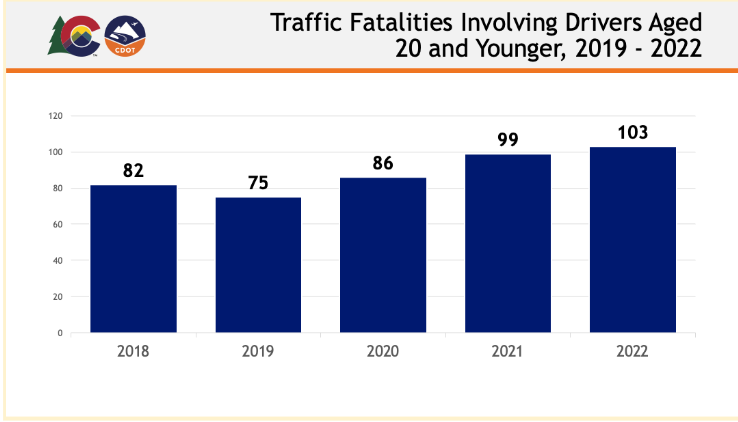CDOT addresses rise in teen fatalities during National Teen Driving Safety Week; urges parents to get involved
News Release
Statewide — More than 16,000 teenagers between the ages of 15-19 have been involved in crashes in Colorado so far this year, according to CDOT crash data. That’s approximately 57 every day. National Teen Driving Safety week is Oct. 15-21 and provides a crucial opportunity for parents, guardians and young drivers to discuss the life-and-death importance of driving safely..
In Colorado, 61 teen drivers have died so far this year on the road, up 53% from this time last year. Also concerning is the number of fatal crashes that involve teen drivers. So far this year, 73 roadway fatalities have involved a teen driver, up 33% from this time last year.
“Driving is a pivotal rite of passage, but it comes with tremendous responsibility,” said Col. Matthew C. Packard, chief of the Colorado State Patrol. “The stakes are high, as young drivers often underestimate the risks they face on the road. Unfortunately, we've seen a distressing increase in teen fatalities on our roads. These statistics emphasize the need for education, awareness and parental involvement.”
According to the Colorado State Patrol, the most common citations among teen drivers are speeding, careless driving and not wearing a seatbelt. Tragically, seat belt use is lowest among teen drivers. In fact, the majority of teenagers involved in fatal crashes nationwide are unbuckled — in 2021, 51% of teen drivers who died were unbuckled. Additionally, when the teen driver involved in the fatal crash was unbuckled, nine out of 10 of the passengers who died were also not wearing their seat belts.
According to the Centers for Disease Control and Prevention, teens are more likely to be killed in an alcohol-related crash than anyone else. Even though the minimum legal drinking age in every state is 21, data shows 19% of 15- to 18-year-old passenger vehicle drivers involved in fatal crashes in 2021 had been drinking.
“Teen drivers face unique challenges, including inexperience, distractions and peer pressure,” said CDOT’s Office of Transportation Safety Director Darrell Lingk. “We urge parents and guardians to play an active role in guiding their teens to become responsible drivers. By setting clear ground rules, modeling good driving behavior, and having ongoing conversations about the dangers of distracted driving, impaired driving and speeding, we can help our young drivers make smart decisions and protect themselves and others on the road."
In 2022 there were a record number of young drivers involved in fatal crashes resulting in 103 deaths.

CDOT emphasizes the need for parents and guardians to play an active role in shaping their teen's choices behind the wheel. To help protect your teen and guide them toward responsible driving, here are some key strategies:
Have conversations: Initiate open and ongoing discussions with your teen about driving laws and safe driving practices. Your guidance as a parent can make a significant difference.
Know the laws: Familiarize yourself with Colorado’s nighttime driving restrictions, passenger restrictions, and graduated driver licensing (GDL) rules on the CDOT website. Enforcing these laws with your teen promotes safer driving habits.
Be a role model: Set an example by consistently practicing safe driving habits yourself — including driving distraction free and obeying the speed limit. Your teen is more likely to emulate your behavior.
Address cell phone use: Encourage your teen to put away their phones while driving, designate a passenger as a texter or navigator, or pull over safely before using a mobile device. Remind them that texting while driving is six times more dangerous than drunk driving, according to the National Highway Traffic Safety Association (NHTSA).
Promote responsible choices: Discuss the risks of impaired driving, seat belt non-compliance, distracted driving, speeding, and the influence of passengers with your teen. Emphasize the consequences of not following these rules.
Parents are the number one influence on a teen driver’s safety. Self-reported surveys show that teens whose parents impose driving restrictions and set good examples typically engage in less risky driving and are involved in fewer crashes. CDOT urges parents and guardians to be a good example and get involved in their driving habits from the beginning and stay involved for the duration of their teen years.
Know Before You Go
Travelers are urged to “know before you go.” Gather information about weather forecasts and anticipated travel impacts and current road conditions prior to hitting the road. CDOT resources include:
- Road conditions and travel information: COtrip.org
- Download the COtrip Planner app: bit.ly/COtripapp
- Sign up for project or travel alerts: bit.ly/COnewsalerts
- See scheduled construction lane closures: bit.ly/laneclosures
- Connect with @ColoradoDOT on social media: Twitter, Facebook, Instagram and YouTube
Remember: Slow For The Cone Zone
The following tips are to help you stay safe while traveling through maintenance and construction work zones.
- Do not speed in work zones. Obey the posted speed limits.
- Stay Alert! Expect the unexpected.
- Watch for workers. Drive with caution.
- Don't change lanes unnecessarily.
- Avoid using mobile devices such as phones while driving in work zones.
- Turn on headlights so that workers and other drivers can see you.
- Be especially alert at night while driving in work zones.
- Expect delays, especially during peak travel times.
- Allow ample space between you and the car in front of you.
- Anticipate lane shifts and merge when directed to do so.
- Be patient!
Download the COtrip App!
The new free COtrip Planner mobile app was designed to meet the growing trend of information on mobile and tablet devices for the traveling public. The COtrip Planner app provides statewide, real-time traffic information, and works on mobile devices that operate on the iOS and Android platforms. Visit the Google Play Store (Android devices) or the Apple Store (iOS devices) to download!
